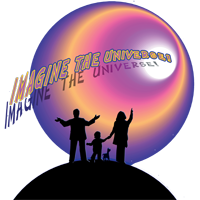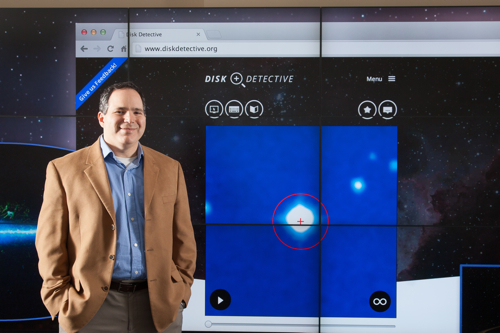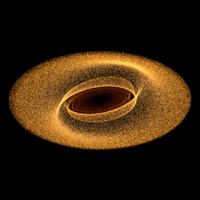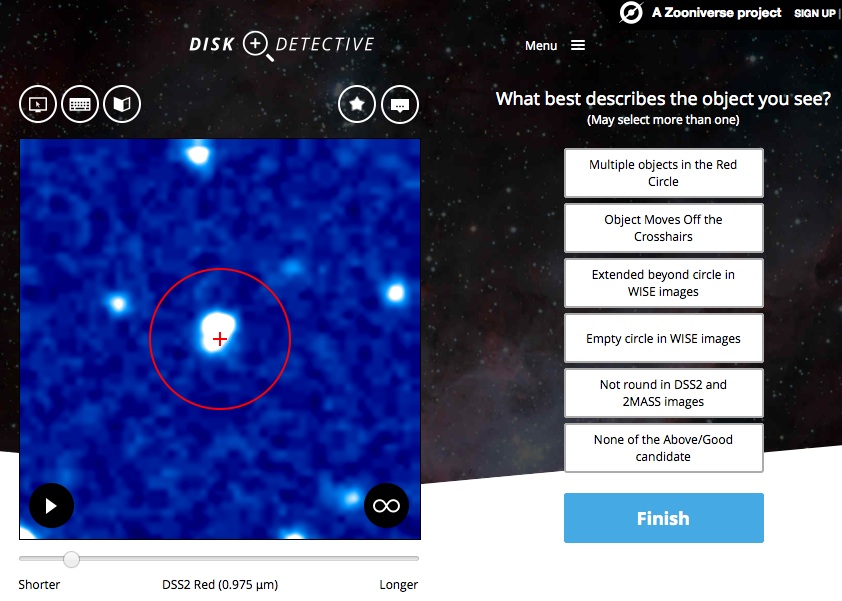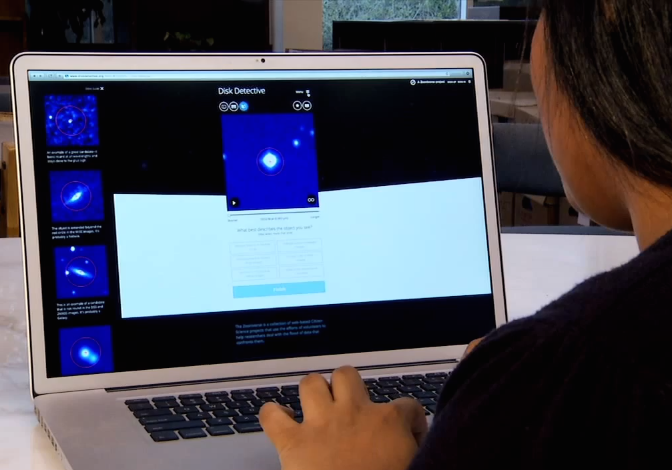Profile: Dr. Marc Kuchner
Biography
Marc Kuchner was born in Montreal, Canada, while his Dad was a resident physician at McGill University. However, Marc did most of his growing up in Long Island, New York, where his family moved when he was just 4 years old. Marc first got interested in astronomy through the original COSMOS TV show hosted by Carl Sagan. This fascination was fueled by frequent family trips to Vanderbilt Planetarium.
Marc went to Harvard for his undergraduate work and Caltech for his graduate school. Sometime during grad school, he took a year off to work at a recording studio and to learn what the recording industry was all about. It just so happened that Dwight Yoakam was recording an album at the same studio at that time, which sparked Marc's interest in country music. He even had the chance to make coffee for Dwight!
When Marc returned to graduate school, he was determined to pick a research topic that was as exciting to him as music. He started asking around to find an interesting research project that could form the basis of his Ph.D. work, and found a potential project studying star systems outside our solar system. At that time, exoplanet research – research into planets around other stars – was just emerging as an active field of study. It just so happened that this professor, Mike Brown, had some "terrible data" that might just show an image of a planetary system around another star. The hope was that the data would hold an image of the dust in the star system. Why dust? Because dust is brighter than the planets in a system. The idea that we could make an image of another planetary system was the ticket for Marc – he found it just as exciting as the music industry (if not more!).
Marc's resulting Ph.D. thesis was simply called "Exozodiacal Dust". There is dust in our Solar System orbiting our Sun. This dust, called "zodiacal dust," has been released by comets and asteroids. When you see similar dust in other star systems the dust is called "exozodiacal dust".
After finishing his Ph.D., Marc went back to Harvard for a postdoc research position, and then a second postdoc at Princeton.
Current Work
Marc currently works as an astrophysicist at NASA's Goddard Space Flight Center. He was drawn to Goddard, and NASA, because his great uncle Lenny worked for NASA in the 1960s. Lenny was an electrical engineer recruited out of the U.S. Army. At that time there was no such thing as an aerospace engineer, and Lenny loved the idea that they were taking his knowledge and applying it to space. The idea of being on the cusp of the unknown was infectious – Lenny told Marc stories about working at NASA and gave him a space pen. Marc was hooked. (Marc also notes that Lenny is the perfect name for an uncle, if you have a choice!)
"Have you discovered a planetary system today? If not, don't worry. At Disk Detective.org if you have just five minutes you can join me and my NASA colleagues in the hunt for planetary systems." That's what Marc says to people when he tells them about his latest project, Disk Detective.
DiskDetective is a citizen science project to find new planetary systems by searching for "debris disks", kind of like the asteroid belt in the Solar System. The idea is that it's very hard to directly see a planet, but asteroid belts are much easier to detect, with all those ground up asteroids reflecting starlight.
The citizen science part means that the project is designed for anybody to help out – no Ph.D. required. Marc says, "About 30,000 people have participated so far from all around the world and that's really touching to think about."
Typical Workday
Marc works at his computer most of the day. Like many successful scientists, much of his time is spent making sure others are able to do their research, which means he spends a lot of time writing proposals and wading through bureaucracy. But maybe once or twice a day he has meetings with one of his students or postdocs to talk about their projects. These meetings are where Marc gets to learn new things, especially about current software and gadgets he hasn't had time to discover for himself.
Free Time
In his free time, Marc goes to the basement with his toddler and they bang on the drums together. He also has been known to write a country song or two.
Marc has a passion for teaching scientists how to better communicate their discoveries, and he gives workshops to help scientists to do just that. When asked why he thinks this is important, he says, "In astronomy, there are a lot of places where you can hear about what scientists are doing. However, the experience of doing science is something few people get to encounter. I want more people to feel that rush, to feel the sensation of going over a cliff into the unknown, because only once you have had that experience does the world of knowledge come into focus."
Questions and Answers
What do you like about working in science?
The freedom. I'm still amazed that I get to work on almost anything I want that's related to NASA (and that's a super wide range of topics).
If you weren't a scientist, what would you be?
I'd be writing songs or giving my workshops.
If time travel were possible, when and where would you visit, and why?
Gee it would be cool to visit the past and meet some animals that have gone extinct, like dinosaurs and mammoths. And I'd like to watch the solar system forming somehow – from a safe distance.
As a scientist, you must be in contact with people from all over the world. What is the most unusual question or comment you have ever gotten?
I regularly get emails and letters from people with their own hypotheses for how physics works or how the universe formed. You can imagine that these get pretty weird sometimes. Sometimes they even weave in God and alchemy and Michael J Fox.
If you could invite three people from throughout history to your house for dinner, who would you invite and why?
I'm thinking I would have Einstein over for dinner, so I could ask him about God and alchemy and Michael J Fox.
Do you have a family?
I have a 2 year old son named Miles Horatio. Miles, of course, are units of distance (space). Horatio is from a word that means "hour" (time). So to me, Miles Horatio means "space-time". To Miles, my name probably means "big guy with arm hair".
Publication Date: October 7, 2015


